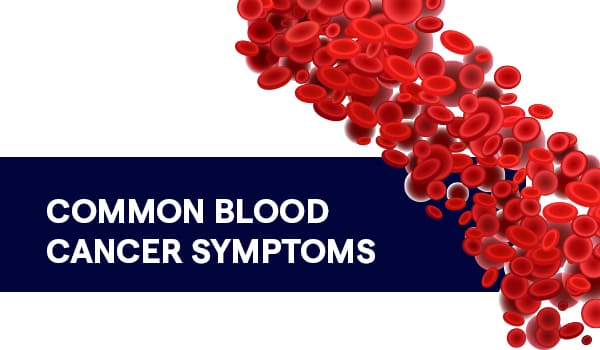
White blood cells, also known as leukocytes, are responsible for fighting infections and diseases. They are part of the immune system and can identify & destroy viruses, such as bacteria, that harm the body and. Lastly, Platelets, also known as thrombocytes, are responsible for blood clotting. They help to stop bleeding by clumping together and forming a plug at the region of an injury.
Blood cancer can happen when the bone marrow, which is responsible for producing blood cells, produces abnormal cells that do not function properly. The abnormal cells can grow and multiply quickly, crowding out healthy cells and leading to a variety of symptoms.
Common blood cancer symptoms can vary depending on the specific type of cancer and individual patient condition. However, some common blood cancer symptoms include:
⦁ Fever: An elevated body temperature.
⦁ Cough: A forceful expulsion of air from the lungs, often caused by irritation.
⦁ Fatigue: Feeling tired and lacking energy.
⦁ Pain: Can range from sharp & sudden to dull and achy.
⦁ Shortness of breath: Difficulty in breathing & feeling of tightness in the chest area.
⦁ Headache: Pain in the head, which can vary greatly in location and intensity.
⦁ Sore throat: A scratchy or painful sensation in the throat.
⦁ Runny or stuffy nose: A discharge or congestion in the nasal passages.
⦁ Diarrhea: Loose and frequent bowel movements.
⦁ Nausea: Feeling of sickness and the urge to vomit.
If you notice any of the symptoms mentioned above persist beyond 1-2 weeks, book an appointment at Sir Ganga Ram Hospital Oncology Department for early intervention.
Blood cancer treatment has made significant advancements in recent years, offering new hope to patients facing this disease. The 5-year survival rate for all subtypes of blood cancer is 65.7%, according to the most recent data.
Leukemia, a common type of blood cancer that affects the bone marrow's ability to produce healthy blood cells, is one of the most common forms of blood cancer in India. There are several subtypes of leukemia, each with its unique characteristics and treatment options. Acute forms of leukemia, such as ALL and AML, require intensive treatment, while chronic forms, like CLL and CML, progress more slowly and can be managed with targeted treatments.
Lymphoma, another type of blood cancer, affects the lymphatic system and presents in two main forms: Hodgkin lymphoma and non-Hodgkin lymphoma. In India, lympho-hematopoietic malignancies constitute 9.5% of all cancers in men and 5.5% in women. Treatment for lymphoma may include chemotherapy, radiation therapy, and stem cell transplant, depending on the subtype and individual patient characteristics.
Myeloma, also known as multiple myeloma, is also a type of blood cancer that stems from the plasma cells detected in the bone marrow. These abnormal plasma cells multiply uncontrollably, leading to the overproduction of abnormal proteins that can cause various complications in the body.
In India, the latest statistics reveal that myeloma accounts for approximately 2% of all cancer-related cases in the country. The incidence rate of myeloma in India is estimated to be around 1.7 per 100,000 population, with a slightly higher prevalence in males compared to females. The mortality rate associated with myeloma remains a problem, highlighting the importance of early detection and timely intervention in improving patient outcomes.
In the latest advancements in blood cancer treatment, researchers focused on developing targeted cures that specifically target cancer cells while minimizing damaged tissues. Immunotherapy, which harnesses the body's immune system to fight cancer, has shown promising results in some blood cancer patients. CAR T-cell therapy, a type of immunotherapy that modifies a patient's T cells to recognize and attack cancer cells, has been approved for certain forms of leukemia and lymphoma.
Did you know? In India, a person is diagnosed with blood cancer every five minutes. It's a statistic that weighs heavily on our hearts, but there's hope.
At Sir Ganga Ram Hospital the best Medical Oncology Hospital in Delhi, we understand the urgency of early detection. Blood cancer is treatable, especially when caught early. That's why we're committed to raising awareness and providing exceptional care to our patients.
Are you also experiencing frequent fatigue, fever, or unexplained weight loss? These could be signs of blood cancer. Schedule an appointment with our doctors.
Sources: